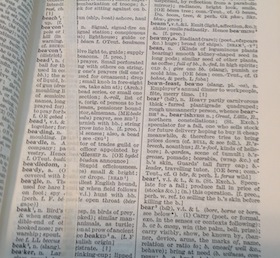I was browsing through the dictionary the other day with a friend, as people do, and we learned about something that bears and humans have in common. I had just bought a 1934 edition of The Concise Oxford Dictionary of Current English, a lovely little book with a soft leather cover, gilt-edged leaves, and a ribbon for marking your place. It cost only $1 at a used book sale. It looked to me like the type of thing a poet might slip into her backpack, right next to the speckled black and white composition book.
My friend turned to the entry for one of our favorite animals, the bear, which, we learned, is a plantigrade quadruped. Plantigrade? Flip, flip, past chorography and gurry and odium. Turns out that bears and humans are both plantigrade; that is, we place the entire sole of the foot on the ground when walking. This is in contrast to digitigrade animals (flip, flip, back past lepidopterous and etui), which walk on their toes (or digits) without placing the heel to the ground (cats and dogs, for example).
It wasn’t until later that I wondered if plantigrade is related to plantar, as in plantar wart. Indeed it is; the two are connected by their shared descent from the Latin word planta, or sole of the foot, which is where plantar warts appear. Planta also means sprout or cutting, and in fact the noun plant, as in those green and gold things I see outside my window, may even come from the Latin verb plantare, which means to push into the ground with the feet. From what I know of field botanists, who do a lot of hiking, the connection between plants and feet on the ground still seems appropriate.
The –grade part of plantigrade, by the way, comes from the Latin word gradus, or step, and appears in other words to describe the way something moves. A moon or planet with a retrograde orbit or spin, for example, moves clockwise (east to west), opposite to the direction of most astronomical bodies. If you know what an ungulate animal is, you can probably figure out what unguligrade means. And now, if you will excuse me, it’s time for me to make my plantigrade way back to the dictionary for more browsing.
